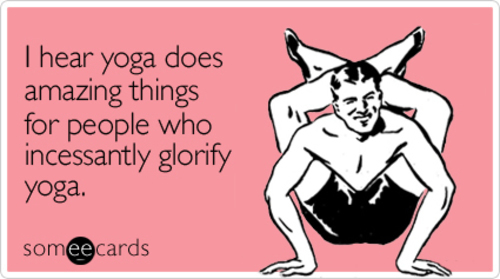The title may be a little aggressive but your body asked me to tell you that. Why? Every day, more and more research comes out about the benefits of yoga. You may have heard yoga is good for depression, lowering stress and anxiety, reducing inflammation, etc., etc., but maybe despite the endless benefits, you’re still hesitant to try yoga.
The first time I tried yoga, I was 22 years old. I took a class with my sister at the community college. During savasana (a resting pose at the end of each class where you just lie on your back), I thought, “This is stupid. Why am I taking an hour long exercise class to just sit here for the last five minutes? What a waste of time.” Clearly, I was missing the point. And so are you if you’ve said any of these things about yoga.
“I’m not flexible enough to do yoga.”
This is like saying you are not in shape enough to go to the gym. Sure, a lot of people who do yoga are flexible, but yoga is more about your mental and emotional flexibility than physical flexibility. No one ever achieved enlightenment by touching their toes or putting their leg behind their head. That’s not where the answers are. The answers lie within and yoga helps us go within. That said, if going within isn’t what you’re ready for right now, of course yoga can help you become more physically flexible. Keep in mind that if flexibility was really the key, Cirque du Soleil performers would be the wisest gurus on the planet.
“It’s too hard.”
I used to play bass guitar and people would ask me, “Oh, is that easy?” (I don’t know why, presumably it seemed easier because it had four strings?) I would always answer, “Not if you want to do it well.” Nothing is easy if you want to do it well. Yoga is the same, but that doesn’t mean it has to be hard. There is yoga for everybody and there is yoga for every BODY. Seriously. Be smart about how and where you start, however. When I began playing the bass, I wasn’t slapping like Les Claypool at my first lesson. So don’t pick a hot, 90-minute, power flow yoga class for your first time. Start with a beginner class or a gentle class.
The temptation when going to your first class is to make sure you’re “doing it right” so you can look like everyone else. More than anything though, you should listen to your body. Not listening to our bodies is how we get hurt. Remember, the instructor is a guide. If a pose doesn’t seem right, modify it. Pay attention to how it feels. It’s your body and it’s your practice.
“I could never wear those little yoga pants.” Or “I’m too intimidated.”
Sure, there are plenty of yoga studios where the teachers look like models and everyone is wearing coordinating $200 yoga outfits, but there are even more where that is not the case. It’s easy to find them. Look at their websites. Find a teacher that says “yoga is for everybody” or something similar. That’s the teacher to try. And wear whatever you damn well please, as long as it’s comfortable. (Incidentally, that’s good rule for life, too.)
“I’m too old.”
There is chair yoga, senior yoga, gentle yoga, restorative yoga. This woman makes your argument invalid.
“But I’m Christian.”
Yoga is not a religion. You do not have to be Hindu or Buddhist or anything else to practice yoga. The practice of yoga can often become very spiritual though, and by deepening your connection to yourself, you may deepen your connection to the divine. If you’re still not convinced, you can find a more in-depth article about Christianity and yoga here.
One of my teacher’s teachers, Erich Schiffmann said this of yoga:
One of the main themes I always want to reiterate is that Yoga is a lifestyle. Yoga is about the way you do your life, not just part of the time, but all the time. The profound working hypothesis for how to do this, and this is the summation sentence at the end of many pages of figuring things out, is this:
THINK LESS and LISTEN MORE
because when you do KNOWING flows in,
and then GIVE EXPRESSION
to what you find yourself Knowing,
whether you can explain it yet or not.
It took having a stroke to slow me down enough to appreciate yoga. A stroke disconnects the mind and the body in such a startling way. One of the hardest things about recovering from my stroke (or probably any major health crisis) was the lack of trust I had in my own body. I was never sure what I was going to be able to do or not do, from putting on a sock to riding my bike. So for a long time, I just didn’t do much. As a result, I became more fearful and less sure of myself.
It’s not just something as dramatic as a stroke that disconnects us from our bodies. Our constant internet access may make us feel more connected to each other but now we’re even less present in our physical reality than ever before. I’m guilty of this myself–texting while I’m walking the dog, talking on the phone while driving (handsfree of course), shoving food in my mouth as I’m running out the door. All of these things are keeping us from really listening to our bodies. So when they don’t work how we expect them to, when they get sick or break down, we feel like they’ve betrayed us. In reality, by constantly ignoring our bodies, we are the ones betraying our bodies.
Try a yoga class. Listen to your body. I promise it will thank you.
My yoga practice has brought me back to myself by teaching me how to really be in my own body. It has restored the mind/body connection that I wasn’t sure I’d ever get back. I’m so grateful for yoga that I became a yoga teacher last year. Just like any good teacher, I will forever remain a student. So now when I take a class, during savasana I think, “please, just five more minutes here.”
WARNING!
Doing yoga may cause the  following side effects:
following side effects:
- Love (of self, of others, of life)
- Calm
- Happiness
- Patience
- Being nicer to people
- Knowing yourself
- More flexibility- mentally, emotionally, and physically
- Desire to wear fun pants
Have you experienced the benefits of yoga? How has it affected your life?
We Need Your Help
More people than ever are reading Hormones Matter, a testament to the need for independent voices in health and medicine. We are not funded and accept limited advertising. Unlike many health sites, we don’t force you to purchase a subscription. We believe health information should be open to all. If you read Hormones Matter, like it, please help support it. Contribute now.
Yes, I would like to support Hormones Matter.
Photo by kike vega on Unsplash.
This article was published originally in July 2016.
















Yoga IS an integral part of the Hindu religion and cannot be separated from Hinduism no matter how much well-meaning Christians want it to be so. Contrary to the yoga site you posted in your article, any meditation connected to Yoga is not Biblical meditation. God never commands us to “empty our minds” or to simply chant a mantra over and over again. To do so is to invite demonic oppression and influence into your life. Biblical mediation is consciously choosing to read, dissect and actively think about Scripture itself. It requires an active mind to engage in what God’s word is saying and apply it to our lives.
While it is true, that many people who practice Yoga do not participate in the meditation exercises, the actual, physical poses are offerings to Hindu gods. See the sites below for information from practicing Hindus that Yoga cannot be separated from the Hindu religion and is an expression of that religion. Yoga, by definition, is a religious practice and it is not Christian.
https://www.truthbehindyoga.com/christian-yoga-and-yoga-for-exercise-only/
https://praisemoves.com/about-us-why-a-christian-alternative-to-yoga
I end up in pain after doing yoga every time in the last couple of years, and I think it’s because I’m slightly hypermobile and can easily over-extend myself without realizing it (especially after years of chronic illness, which have left me re-building a lot of my muscles that were under-used while I was very ill).
I’ve started doing moving resistance stretches, and they are working much better for me. They have many of the benefits of yoga, but require a smaller range of motion – making self-injury much less likely for those of us with more flexibility than our musculature can support.
I just wanted to drop this here for anyone who wants the benefits of yoga but is having similar issues. I used to do yoga during my pre-fibromyalgia days and loved it, so I’m thrilled to have something that fits the same niche without the same risks. If you don’t have these issues, both yoga and resistance stretching are wonderful, but it’s easier to find others to stretch with (even if we have to do social stretching over Zoom these days!).
Ethel, I was in the same situation some years back. I’m definitely hypermobile and probably had Chronic Fatigue Syndrome that went undiagnosed for 33 years until it flared again. After the second flare, I knew I had to do some exercise but had never had any improvement working out at a gym or doing yoga. I heard a talk by a local Pilates instructor who emphasized breathing and stretching, both of which I needed to do. At my introductory session, I was able to perform all the exercises she asked, but I was left exhausted and in pain with post-exertional malaise for three days. But I went back and was told I needed stretching to get into shape to do Pilates. It took months of her spending most of an hour rolling my arm- and leg-muscles with a foam ball to loosen them. Gradually, I began to spend longer and longer doing the basic exercises and slowly working up to doing them more precisely and with more resistance.
I’ve since learned about stretching franchises where you lie down and have trained therapists stretch your muscles. I probably would have started at one of those places had they been available then. I want to suggest trying some Pilates with a rehab trainer if such services are available. Otherwise, doing resistance stretches sounds ideal. Thanks for suggesting Zoom sessions. I’m going to look for them online.
Yeah! Ditch those excuses and start doing yoga today!